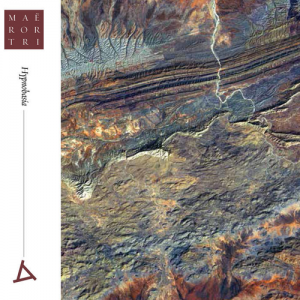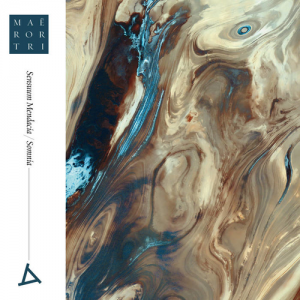 Recorded between 1989 and 1992, Maëror Tri‘s Hypnobasia, Sensuum Mendacia and Somnia were originally released on cassette by various European labels, the latter appearing as one side of a split tape with Nostalgie Eternelle.
Recorded between 1989 and 1992, Maëror Tri‘s Hypnobasia, Sensuum Mendacia and Somnia were originally released on cassette by various European labels, the latter appearing as one side of a split tape with Nostalgie Eternelle.
Hypnobasia appears as one album of Zoharum‘s ongoing programme of re-releases, uniformly packaged to match Sensuum Mendacia/Somnia (which appear together on a separate disc) in gatefold card sleeves adorned with abstract-seeming images which turn out to be landscape photographs seen from a great height. Remastered and expanded with the addition of three compilation tracks from the same era, the two discs present just under two hours of Maëror Tri at their most overwhelming.
From the opening fug-feast of “Vermis” via the skull-piercing drones of “Drowning Into Hatred” until the whiteouts of the brain-scraping “Ecstatic Singing” and the reversed, almost-melodic loops of “Exilitas” conclude matter, there’s not much shelter from the scouring that the trio dish out here, save perhaps in the ominous clanking guitar reverberations of “Athanor” en route. Pieces such as the epic echo wallow of “Nunitus” and the mechanised birdsong propulsions of “Augurium” are at once templates for a thousand drone(-gaze/illbient/isolationist) albums that followed, and none the worse for being pioneering examples of how to blend the familiar (environmental recordings) with the utterly bleak and seemingly unnatural — yet somehow equally organic — electronic manipulations of their instruments into a successful whole. The aptly-named “Tormentum” reaches a peak where the listener may well decide that it’s either time to die, or to persevere with the gut-wrenching churn of unheimlich electronic smears of some of the most unwholesome deployments of effects pedals heard in many a decade. It’s almost actively unwelcoming, splurging and snurling sound into an almost distasteful miasma that offers not the slightest hope of pleasure, while never actually in any way becoming unlistenable along the way. This is in itself something of a remarkable achievement, given the trio’s version of what might best only be loosely called music; but Maëror Tri are nothing if not enthralling in their ability to make the sonically disturbing work exceedingly well at being what it is. Sensuum Mendacia takes a more even-tempered approach, its textures played out with less pummelling and more sliding, layered tones unfolding and extrapolating from decidedly unfixed points in time and space. The six tracks aren’t going anywhere in a hurry, eventually depositing the listener somewhere far removed entirely, and manage to pull off the trick of making the arrival and departure seem to be spaced apart by an inconstant and apparently unmeasurable duration.
Sensuum Mendacia takes a more even-tempered approach, its textures played out with less pummelling and more sliding, layered tones unfolding and extrapolating from decidedly unfixed points in time and space. The six tracks aren’t going anywhere in a hurry, eventually depositing the listener somewhere far removed entirely, and manage to pull off the trick of making the arrival and departure seem to be spaced apart by an inconstant and apparently unmeasurable duration.
It’s definitely an album which favours headphone listening, though the window-shaking properties of some passages are not to be underestimated, nor perhaps missed (neighbouring residences be warned). “Soma 2” lets the queasiness back in, swimming through what feels like the liquid treacle of guitar FX that have been double-dipped in hallucinogens so the audience don’t necessarily have to be, stumbling determinedly into a harmonic slowdown.
There are moments of disturbance, all clanking chains, drips and spurting noise blasts, as found on the soundtrack-like “Mental Electricity”; while the last track, “Animorum Post Mortem Ab Aliis Ad Alios Transitio”, meanders out in a sprawling series of atmospheric dissipations and micro-cyclones, spinning dizzily but sedately towards a unwinding termination. There’s perhaps more affinity with the likes of Flying Saucer Attack than Main (one of their closer contemporary reference points, should one be needed) on “Choir of Transcendence”, which achieves its particular Nirvana thorugh an ear-splitting swell of recursive echoes that should clear the sinuses rather effectively — though perhaps not recommended as a cure for the common cold unless there’s no headache presently involved. Likewise, the loping melody of “Aegritudo” plays off an encroaching wall of drone that eventually gets its entropic way in a subtly-done duel of two approaches to guitar manipulation. There’s an intriguing use of vocal tones floating throughout Somnia (originally released as Somnia Et Expergisci); muffled, unintelligible, but adding a human warmth to the second half of the disc that brings in a hint of Popol Vuh‘s ethereal spirituality to proceedings. The guitars are much more self-evidently themselves here, cycling in identifiably strummed and softly coaxed — and more musical — loops among the distant earthquake detonations and still usually overwhelming use of effects and volume dynamics. Sometimes, as on “Vox Sirenum”, it seems like Maëror Tri are struggling through a snowstorm, or perhaps the ashy fallout from a volcanic explosion, reverb and echoes drifting and walling into slurry around them as they trudge steadfastly on, as if the keeping moving is the only thing between the trio and the engulfing embrace of the blizzard that surrounds them.There are what seem to be siren voices calling to them on “Onyx”, atonal shapes emerging ghostlike from the billowing and eddying mists, glimpsed yet never grasped entirely, thrumming and faintly ominous — though the threat never seems quite realised. Once again, the end comes like the heat-death of the universe, icing over solemnly through one final hurrah on “Indagatio”, until a somnolent quietude is attained.
-Linus Tossio-



